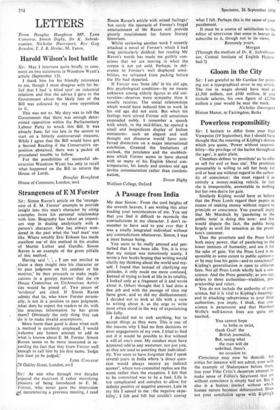Strangeness of E M Forster
Sir: Simon Raven's article on the 'strange- ness of E. M. Forster' attempts to provide insight into this man's character by citing examples from hit. personal relationship with him. Biography has taken an import-1 ant step in dealing analytically with a person's character. One has always won- dered in the past what the 'real man' was
Where notably Eric Erikson has made excellent use of this method in his studies of Martin Luther and Gandhi, Simon Raven is an example of the gross pitfalls ' of this method.
Having said `. I am not entitled to ,claim a deep insight into his character or to pass judgment on his conduct or his motives,' he then proceeds to make impli. cations in a gossipy manner that the us House Committee on UnAmerican Activi- ties would be proud of. Two pieces of 'evidence' are cited. If Simon Raven admits that he, who knew Forster person4 ally, is not in a position to pass judgment,
[what does he expect the readers to do, with !the precious information he has given +them? Obviously the only thing they can Lido is to make invalid assumptions.
More harm than good is done when such a method is carelessly employed. I would elcome any honest attempt to add to what is known about E. M. Forster. Simon aven seems to be more interested in re- r,ording the fact that they knew Forster well enough to call him by his first name. 'Judge 'not least ye be judged,' Lynn Converse (78 Oakley Street, London, sw3
Sir :' As one who through two decades enjoyed the recurrent if rather mortifying pleasure of being introduced to E. M. Forster, who never gave the impression 6 remembering a previous meeting, I read
Wolfson College, Oxford Simon Raven's article with mixed feelings:' but surely the spectacle of Forster's frugal entertainment of Mr Raven will provide ghostly nourishment for future literary, historians.
Whilst reviewing another work I recently - attacked a novel of Forster's which I had long particularly disliked; but reading Mr Raven's words has made me guiltily con- scious that we are moving in when the corpse is not yet cold. Perhaps, in def- erence to Forster's well displayed sensi- bilities, we refrained from pecking before the life had departed.
If Forster was 'boiie idle' in his old age, this psychological condition—by no means unknown among elderly figures at old uni- versities—deserves more sympathy than it usually receives. The social relationships which would have induced him to work in his old age did not exist. But when his feelings were stirred Forster still sometimes responded nobly. I remember a speech with which, in the mid-fifties, he opened a small and insignificant display of Indian miniatures: such an elegant and well thought out discourse would have con- ferred distinction on a major international exhibition. Granted the limitations of outlook, the petulance and the snobbish- ness which Forster seems to have shared with so many of his English liberal con- temporaries, his lonely and aimless old age invites commiseration rather than condem4 nation, Simon Digby


































 Previous page
Previous page